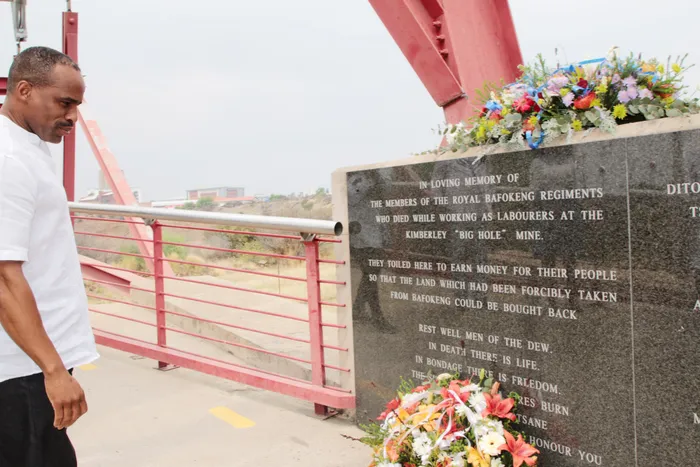Royal Bafokeng on a pilgrimage

Kgosi Leruo Tshekedi Molotlegi of the Royal Bafokeng nation from Rustenburg. Picture: Supplied
THE ROYAL Bafokeng nation from Rustenburg, led by Kgosi Leruo Tshekedi Molotlegi, participated in a pilgrimage to honour their descendants who worked in Kimberley during the diamond rush of 1871.
He led his Royal Family Supreme Council to lay wreaths at the Big Hole Museum.
The Bafokeng nation comes to Kimberley every three years to recognise Kimberley for the role it played in them acquiring their tribal land.
Their recent visit was the 40th pilgrimage to Kimberley. The first took place in 1982.
Their last visit to Kimberley was in 2019 and they will return to the Diamond City in 2025.
Molotlegi was accompanied by Senior Kgosana Tumagoe Tumagole, Councillor Mogari Mokgatle and Mmakgosanakgolo Tumagole.
Another 400 delegates from 29 villages were bused to Kimberley to participate in the ceremony.
The delegation was welcomed by the Acting Premier, Mase Manopole, who delivered the keynote address.
A Royal Bafokeng Heritage Specialist, Khumo Moobye, said this ceremony is performed in Kimberley every three years due to its significant link to the nation.
“We have what we have today because of Kimberley. It all started here,” she said.
Manopole highlighted that the people of the Northern Cape and the Royal Bafokeng nation will forever be connected through a single umbilical cord due to the role that the Province played in the future of the nation.
The rich history goes back several years to when the Bafokeng found themselves with no land to call their own.
Hundreds of young men from Phokeng were later dispatched to work on the Kimberley diamond fields and return with money in hand . . . thanks to the wisdom of the then head of the Bafokeng, Kgosi Mokgatle.
Manopole acknowledged the importance of the pilgrimage.
“We understand and know the struggle that you had to endure to be where you are today. Today, the Royal Bafokeng nation is regarded as one of the richest tribal nations in Africa, because of the vision that your ancestors had of preserving what God has given to them . . . the land and its minerals.
“You have fought for more than a hundred years to retain the title to the land your ancestors occupied for hundreds of years,” Manopole added.
“Your ancestors had to defend their land and ancestral rights against a succession of predators, from Mzilikazi to the British colonists and the Boers.
“As Solomon Tshekiso Plaatje, whom the municipality is named after, denotes in one of his writings, as a reference to the Native Land Act of 1913, and I quote: ‘Awaking on Friday morning, June 20 1913, the South African Native found himself, not actually a slave, but a pariah in the land of his birth’.”
Manopole elaborated that the most visible impact of the act was that it denied Africans access to land which they owned.
“This act was so brutal, to the extent that it led to families leaving their homes to seek wealth elsewhere,” she said.
“Evidently, the act seized the very asset which was central to the lives of African people and rendered them destitute.
“As recorded in the Ilanga Lase Natal newspaper, when the then president of the African National Congress, John L Dube, criticised the Native Land Bill and stated that it was intended to keep Africans down, to tell them ‘get out, go back to your locations, or else go back to work for your white masters’.
“The pilgrimage undertaken by Kgosi Molotlegi and his subjects is an emotional and spiritual journey to say ‘Thank, re ya leboga!’ to the husbands and sons of the Bafokeng Nation, who had to heed a call to save their ancestral land from the evil of apartheid laws.”
She said the shadow of the Natives Land Act and other laws that followed are still evident in post-apartheid South Africa.
“A significant proportion of land remains in the ownership of a select few. However, we welcome the adoption of the Expropriation Bill after lengthy constitutional delays.
“The bill replaces an apartheid-era law and would allow for zero compensation to be paid for property when expropriate takes place under certain circumstances.
“This is a progressive bill, not only because it brought the legislation in line with the Constitution, but also because it sets out the framework to redress forced land dispossession. This bill will allow government to address the land question and bring dignity to our people,” she concluded.


